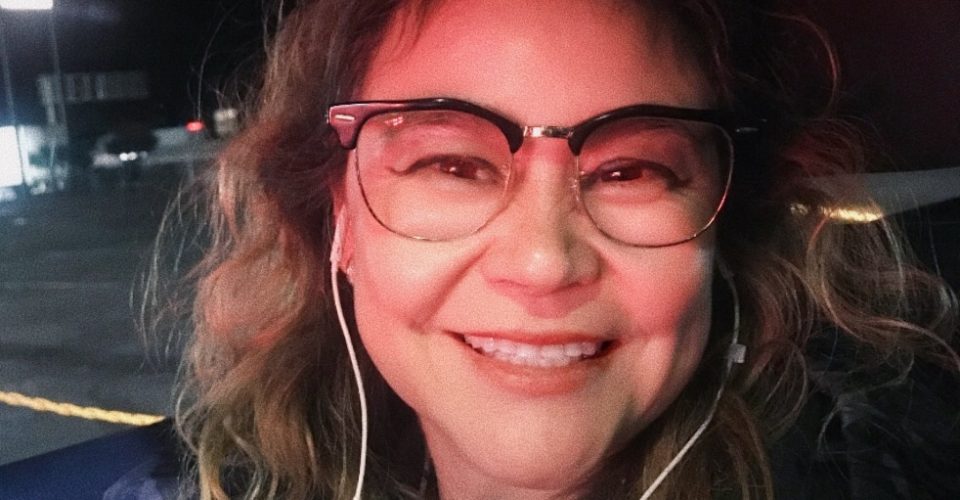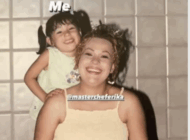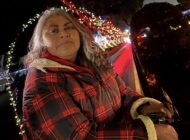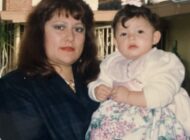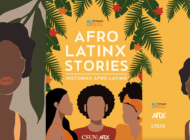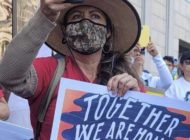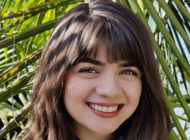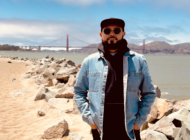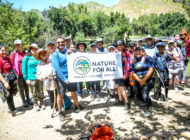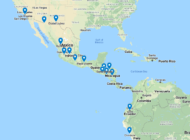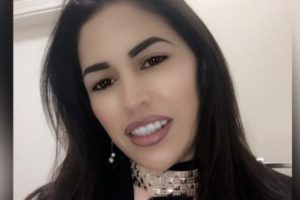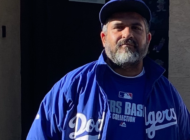In this episode of the series titled Historias de Mamá, I feature a one-on-one conversation with the woman who raise me herself, my mom. Her name is Ana Beatriz Arévalo and has taught me how to be a humanitarian. In this interview I ask her a series of questions to get to know her better and do a quick speed-run of other silly questions to see how fast she answers. She came to the United States when she was around 13 or 14 and retells of her experiences as an adolescent living in Los Angeles by herself, to be coming a successful woman raising a family in Van Nuys. Mom Ana, now her pseudonym in her family, tells you about the unknown traditional Salvadorian culture.
Por BRYAN ARÉVALO
EL NUEVO SOL
Bryan: Hello and welcome to Radio Nepantla, a podcast from El Nuevo Sol, the multimedia site of the Spanish-language journalism program at California State University at Northridge.
My name is Bryan Arevalo.
The name of our podcast was born from the word Nepantla that comes from the Nahuatl language and means to be in the middle. The indigenous people of Mexico used this word to speak of being between a dominant culture and their culture of origin.
The Chicano movement made this space one of cultural resistance that transcends two cultures and many borders.
In this series titled “La Historia de Mama: A Conversation with Ana,” will feature a one-on-one conversation with the woman who raise me herself, my mom. Her name is Ana Beatriz Arevalo and has taught me how to be a humanitarian. In this interview I ask her a series of questions to get to know her better and do a quick speed-run of other silly questions to see how fast she answers. She came to the United States when she was around 13 or 14 and retells of her experiences as an adolescent living in Los Angeles by herself, to be coming a successful woman raising a family in Van Nuys. Mom Ana, now her pseudonym in her family, tells you about the unknown traditional Salvadorian culture.
Bryan: Hey, Mom Ana.
Ana: Hey, how are you?
Bryan: This is my mom. Her name is Ana Arevalo – Ana Beatriz Arevalo. I call her Mom Ana because we have – well I have two nieces and two nephews who call her Mom Ana. So, I guess its kind of stuck. How long have you been calling you mom Ana?
Ana: Nine years.
Bryan: Nine years. Jesus, nine years.
Wow. Wow. Okay. So, I guess I’ll introduce myself really quick and then I’ll give my mom a chance to introduce herself. My name is Bryan Arevalo. I’m a student journalist at CSUN – a senior journalist at CSUN. I’m going to graduate in like three months. Hopefully, virtually I really don’t want to go in person.
I don’t know what your thoughts are about that. Do you want me to walk the stage?
Ana: Of course
Bryan: I don’t want to walk the stage, but I also don’t mind just staying at home and sitting my ass down behind a computer. But yeah, I live in a small town in Beaumont with my family. Obviously, my mom included. We live in Beaumont.
I don’t know if anyone’s ever heard of it, but Beaumont is a very small town. It’s where the 10 and 60 meets. If you’re familiar with freeways, we’re towards – we’re going East. We’re by the Morongo Casino. But yeah, that’s pretty much it. I think that’s the basic information about me. I’ll go ahead and pass it along to my mom.
Ana: Hi, my name is Ana Arevalo. I work for Inland Behavioral and Health Services. I work in administration. What I do is more numbers and humanities.
I like what I do. And yes, we live in a small town, but we have everything around here. So, we have all parks, recreations. We, we have a lot of hiking trails. It’s beautiful.
Bryan: Nice. I also want to give you the opportunity, mom, if you want to speak in Spanish or you want to talk in English, if you want to do two languages, go ahead. Feel free.
Ana: Okay. So, whatever is easier for me when your question comes. I will answer.
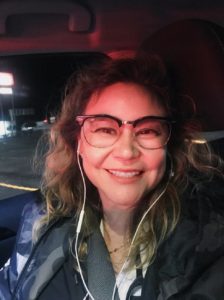 Bryan: All right. So, I’m going to ask you your first question, I think is just so people can actually really get to know you.
Bryan: All right. So, I’m going to ask you your first question, I think is just so people can actually really get to know you.
I’m just going to give a quick background of, of myself before you start. I am a first generation American. I am mixed with a lot of stuff. We have an extensive background with different cultures. I’ll let my mom go more into that and explain her background. As for my father, he is Salvadorian and his family’s mainly Hispanic or Latino/Latinx.
And yeah, I mean, we, we learned Spanish at a very young age. I guess I’m bilingual. However, thanks to my dad. I know a few more languages or can understand them like Italian, Portuguese, French and so on. But enough about me. I’m going to let my mother introduce herself. So, go ahead Mom Ana and take it away.
Ana: Well, basically I born in a small country, which is called Salvador. My mother is Salvadorian. My father used to be at Canadian. So, I can say that I have a mix of both, but my mom’s mother is, well, was Japanese. So, we have a mixture of cultures and beliefs. It’s-it’s good because you know, it enriches your background, your culture, you know, a lot of things that other people might not have the opportunity to know, you experience different themes, different things, different cultures, different languages.
It’s awesome.
Bryan: Nice! So now I can actually testify to that. It’s actually very great to learn different languages to learn different cultures. And I think it actually made me be proud of this family. As weird as it sounds, you know, like we, we know different things. I think more than the average person. I think that’s just me being cocky at this point. But honestly, I’m pretty, I’m pretty proud of our ourselves.
But okay. So, you said that you were born in Salvador, right?
Ana: Of course.
Bryan:] Okay. And I think this is typically like the American story. Like obviously I’m first-generation I think everyone has your own story to tell of how they got here.
In, you know, in a few words or, I mean, in I guess like in a minute or two, can you basically tell your story? Like, and let’s say we’re doing a time run, right, right. I’m going to die in five minutes. Can you tell me a story of how you got to this country in five minutes?
Ana: Well, the main reason why I came to this country is because of the civil war happening in El Salvador. So, everybody was running away because if you weren’t captured by the Guerilla, you were captured by the military, at that very, very young age of seven and up. They didn’t have a choice of women or males. So, they find you, they pick you, they recruit you. My parents didn’t want any of that to happen to us because we had some tragedies happening with some of our cousins. So, he decided that it was better for us to come to America. Okay. To have a better life and a better future.
Thereafter, my parents decided that they didn’t want to live over here because we had our own businesses. It was so hard for them to work for somebody else while you have your own company, you have your own your own lands, you have your own houses and you don’t pay rent. You depend basically on whatever you have. But over here, it’s kind of hard to come in and start all over. So, I remain over here and I make my future. I think that I did very good. I don’t want to be like a cocky, but I’m who I am.
Bryan: Nice. Well, thank you for that. And it was less than five minutes, so good job.
Ana: High five.
Bryan: Some alive, obviously I didn’t die in those five minutes. I think an interesting thing to learn or to know about my mom is that she moved here, I think she said it.
You were a teenager, right? How old were you?
Ana: Well, when I came over here, I was 13 – 14 years.
Bryan: Okay. So, she was 13 or 14 years old. And I think I actually recently learned about this last year before Christmas. We were doing Door Dash and I was asking you a lot of questions about you because I honestly felt like, I know nothing about you.
Ana: Yes, I’m always busy working, trying to make a big future for our family. So, I don’t have time. And I know that I haven’t dedicated so much time to tell my story, but I never thought that that was important. You know, my background.
Bryan: Yeah, no, I think it’s interesting. Personally, I do, because I know that, you know, growing up, I heard a lot of stories of my dad all this shit he went through all this shit he did. You know. And the good and the bad. You know. And I, I think I got to know my dad a lot more from his stories. Like I was able to understand and analyze my dad. You know what I mean? Like I understood where he was mentally like where he is now, mentally, how he’s grown, how he’s changed. The habits that he’s maintained as a youth, because of the stories that he’s told me.
And so, learning about you for the first time was really shocking and I’m remember I would – you know, we’d be delivering food and I’m like, you better.
Okay. So, I would get out of the car to go deliver the food and drop it off in front of someone’s house. But I remember I would run back inside the car and I’m like, “okay, so you were a teenager…” You remember that?
Yeah. And I’m like, “okay, so you’re in my aunt’s house. You were 15 years old. You had no friends…” And she’s like, “yeah, I didn’t have friends or money…” and I’m like, “that’s interesting!” You know, like it, it really lets you know who your subject is. I was able to kind of really understand who you were and where your priorities were and how you are now. And I’m proud of you.
But I think, yeah, fun fact about my mom is that she’s really, really, really good with numbers. I’ve given my mom like the hardest multiplication numbers ever. And she has the numbers, like in a snap. And it’s insane. I’m just like mom, what’s 20% of like $360. And she was like, “well, if you do this and X, Y, and Z, then you get this.” I have no idea how she did that.
But anyways so yeah, you move to the United States. Eventually, you had a family. I was born. I’m going to skip my sisters. I have two older sisters, by the way. I’m going to skip their stories because they don’t matter. I’m talking to my mom. But where did we live when I was growing up?
Ana: I already had a house by then. I have a, you know, like a really good job. I wasn’t getting a hundred thousand dollars pay a year. By then it was a lot, a lot of money. I already had a career
And I start from scratch, from nothing, from zero. From picking up carts and pulling into a machine getting 25 cents or a quarter for every cart that I had returned into Ralph’s. I used to work at Ralph’s before go to work because I didn’t have no income, no food, no nothing. You know, like, as I said, I came in with empty hands.
My parents left because they didn’t like the idea of you know, be important here. So, they gave me the choice and I choose to be here. They told me that I will call them and beg them to come back. I was so prideful and I rather to suck it up and continue with my life.
So, at the age of 13-14, I was going to school. I was pulling carts into Ralph and then one of the managers told me that I, I used to work so hard and he offered me to work two hours before school.
But he was making sure that I get into that bus and going to school. And I think that because they gave me the opportunity, I had the chance to become someone. Thereafter, I get another job cleaning tables in a, in a hamburger place. I don’t know if it’s still there. I don’t know. I haven’t gone. I haven’t gone back in a while. But from there, I, I kept going to school, getting a job in a video house, doing whatever I could.
So, at the age of 15, I already had my own apartment. I was going to church and one of the ladies told me that if I want to have a roommate, I remember that I used to pay 150 for my own apartment. And I said, I don’t know, because I had never lived with anybody. And she said, “it will be good because you’re, a minor, you live by yourself it’s dangerous.”
I never thought about it. You know, like. I took my life so easily. Like, “okay, I have my stuff. I’ve worked so hard.”
But then I ended up with a roommate until the age that I got married with your father.
Bryan: What age was that?
Ana: It was 17.
Bryan: Yeah, my mom got hitched. So, I, I don’t think you answered the question. Where were you when I was born? Like where did we live when I was born? I wanted you to tell that story of about the old house and the family.
Ana: Oh, I’m sorry. I misunderstood. Yeah, we were living in Van Nuys. And I was working with Don Roberto Jewelers back then.
Bryan: Nice. Yeah. I actually liked that house a lot. I mean, it’s the only house ever grew up, you know what I mean? But that house is beautiful. So yeah, I grew up in van Nuys for 11 years. We lived there for 11 years.
Ana: It wasn’t Van Nuys back then. When we moved, the real name was Balboa Lake.
Bryan: Was it really?
Ana: First, it was called Sepulveda and then it was called Balboa Lake. And thereafter it was named Van Nuys, California. Because we were trying to get divorced from Los Angeles district and become another district, San Fernando Valley or something like that.
Bryan: That’s insane. I actually didn’t know that.
Ana: That’s the history.
Bryan: Wow. Yeah. So, I mean, I, I lived there for 11 years. Had no clue about this.
Okay. So obviously I don’t want to take too much time because this podcast is supposed to be pretty short. But I think, you know, we’re going to get down to like the nitty gritty. I’m going to ask you a speed run of questions. Try to answer them as fast as you can. And then we’ll go back to a serious tone and then we’ll finish it off there. Okay. So, speed run:
Who’s your favorite child?
Ana: That’s a tricky question. You never ask a mother that. But I only have one boy.
Bryan: So, the answer is me.
Okay. What’s your favorite cuss word?
Ana: My favorite, what?
Bryan: Cuss word. Your bad word.
Ana: Fatty.
Bryan: Fatty Is not a –
Ana: Gordo!
Bryan: Oh my god. That’s not a bad word!
Ana: Well, I don’t think that I have a – Bitch, maybe?
Bryan: Okay. I was about to say, “be real.” No one can see this, but we’re inside my mom’s closet right now. Just sitting in front of microphones to get good sound, but I’m giving her that stink eye. Cause I know she’s always saying bad words.
Okay. What’s your favorite beer?
Ana: Hmm. I like… I don’t know. I don’t have any favorite beer.
Bryan: Okay. Okay. Favorite alcohol?
Ana: Wine. Red wine.
Bryan: Red wine. Okay. Okay.
If you could live somewhere else, where would you live?
Ana: I would like to live … Washington.
Bryan: Washington. Nice. Nice meet you.
All right. Last question, I guess is I mean again, we’re going to wrap this up pretty soon.
Where do you see yourself in 10 years?
Ana: Well, I see myself advanced in my career and making more money. Cause I’m planning to retire earlier I’m not planning to work on my life. I need to enjoy and live.
Bryan: That is a good response. How old will you be in 10 years?
Ana: How old.
Bryan: Yeah.
Ana: I’m going to be in my early fifties.
Bryan: She’s lying by the way. She’s lying. She’s going to be 59. Jesus Christ.
Ana: Well, why do you ask an age? Why do you ask for age? You’re not supposed to ask.
Bryan: Okay. I guess that was the last question of speed round. I actually no one more. What’s your Zodiac sign?
Ana: Well, I don’t know about everybody says that I’m a Gemini.
Bryan: She’s a Gemini, yes. That is correct. How many languages can you speak?
Ana: Well, that depends …
Bryan: Two. The answer is two.
We’re going to have to start wrapping things up. So, I’m just going to ask you a few more questions. I think we’re going to be done here. But thank you for your time. I know that you work all day. I know that I’ve been in school, in class, and work all day as well. My back is killing me.
Again, we are inside my mom’s closet to walk in closet, so we’re just sitting on the floor with these stools as microphones. My leg is halfway crisscross applesauce. And my back is killing me. My back is killing- my mom’s laying on a pile of clothes that’s why she’s fine.
So, let’s talk about your culture one more time before we wrap things up, obviously you’re Salvadorian and you have a multitude of ethnicities. You’re a kind person you work in Banning as well. You work with the lower income families now, before you didn’t. But I’ve seen you dedicate your time to a lot of these events to support these nonprofit organizations and to support these people who aren’t financially stable, who don’t have resources like we do. And I think that’s something that I applaud for you and I admire you. I think that’s why I’ve learned to kind of be more of a humanitarian myself. So, thank you in that, in that aspect.
But going back to your culture, I mean, just to describe it for those who don’t know what Salvador, how the Salvadorian culture is. That’s a tough question, because Salvadorian culture is something that we don’t live by.
And I can tell you straight up, our family does not practice anything Salvadorian besides the language. And sometimes the music, but as far as food drinks, you know, and everything else, it’s not there. But I’m going to let you explain.
What does Salvadorian culture typically look like?
Ana: Well, El Salvador, you know, like even that is a small country, they don’t have much, we are happy.
We enjoy the weather. We have a nice beach. We have nice places, parks. We have beautiful nature. But we like to dance, every weekend.
There it is called a verbena. It’s a dancing and dancing place all the time.
Bryan: It is like a discotheque?
Ana: Like a discotheque, but we call them verbena because they are like open spaces. No roof, no, nothing. Open spaces with very loud music. Like a concert.
Bryan: Oh, okay.
Ana: Uh-huh like concerts. You know, like anybody goes, anybody can dance, you know, there is a lot of “vendimias”, so you buy yucca, pupusas, chicharrones, all kinds of, you know, like good stuff.
Bryan: What is “vendima-?”
Ana: “Vendimias” are all the little the little places where you can go and buy, you know, yucc- the caritos”.
Bryan: Oh, a vendor.
Ana: Uh-huh! Like a vendor’s, like vendors, but you know like small.
Bryan: Yeah! “Bocadillos.”
Ana: Bocadillos. Mhm.
Bryan: Okay. Bien. All right. Okay. I don’t want to reach 20 minutes, so I’m going to ask you this last question – oh, well actually you didn’t finish. You didn’t even tell me, mom, the culture, you just said you like to dance and eat food.
What kind of food did you guys make?
Ana: Personally, I don’t make any food. I don’t cook. And I never did because we always have someone, we have a cook at home and we have a person who used to clean a lady who used to take care of us. But we cook “carne gizzada.”
Bryan: What does that translate to? Like roasted chicken?
Ana: Like – no beef stew. Beed stew, but you know, Salvadorian style. “Sopa de pata.”
We do “Chumpe.”
Bryan: “Chumpe translates to Turkey”.
Ana: Yuca Frita. Yucca con chicharron, tamales. All kinds of tamales. Sweet tamales for the table.
Bryan: Did you say pupusas already?
Ana: Pupusas! All kinds of pupusas. But pupusas is not the only dish that we make. We make several dishes. We make pacayas, chile rellenos – you don’t even understand that because you haven’t eaten.
Bryan: Yeah. That sounds weird. Pacaya.
Ana: Oh, so good. You know, like I’m going to take you and I’m going to take you to the little vendors, where the best food that you can eat.
Bryan: I’m actually starving right now. So that sounds really nice. But yeah, no, I was just waiting for you to say pupusas because I feel like when people think of Salvadorian food, that’s the first dish they think. I understand we cook a multitude of dishes.
There’s, you know, a lot of different plates that are being served all the time, you know. And it’s hard, you know, to kind of explain these things to a listener, to an audience member, to a person I’ve just met and describe Salvadorian food because we make horchata differently than the Mexican horchata. Which by the way, is actually made with African ingredients? I’m not sure if you knew that.
Ana: I don’t know personally how to make her chatter. The only thing that I know that we make it with “moro.”
Bryan: We use “moro” and we use like this weird ball that looks like a rock.
Ana: That’s “moro”.
Bryan: Well, we use “moro.”
Ana: But that’s what make that specific flavor that you won’t find anywhere else. Like we have our special drinks, you know, like non-alcoholic and alcoholic that we also make.
Bryan: Right, right. Like “chicha.
Ana: Like “chicha.”
Oh, we make “Gallo en chicha,” as well to eat.
Bryan: Is that chicken in alcohol?
Ana: Oh, so good.
Bryan: Ewe. That sounds nasty.
Ana: No, you haven’t tried. That’s what you say. So, you will ask for more.
Bryan: Yeah, because I’m going to be drunk off the chicken.
Ana: That chicken is drunk. You don’t get drunk with that.
Bryan: Okay. Okay. I think our time’s up. So, thank you for your time. Thank you for your love. I’m all crying. I’m all “thank you for being a good mom.”
But I think that pretty much sums you up. I wish we can go more in detail. I wish this was a 45-minute podcast because there’s so much to learn from you.
But yeah. Is there anything else you want to add before we go?
Ana: No, I just want to say thank you for giving me, giving me the chance. I mean, to be with you, and it’s always a pleasure to help you wherever you want, or need.
Bryan: “Or need.” Do we shake hands now?
Ana: Oh, yeah! Okay!
Bryan: This was a good business deal. All right. Well, have a good night. Thanks for meeting with me again. Everyone, stay safe out there and yeah, I’m signing out
Ana: Goodnight! And remember that we still in COVID so take the measures and precautions. Good night.
Bryan: This was an El Nuevo Sol production. A Spanish multimedia site for California State University, Northridge.
Production and editing by Bryan Arevalo.
I am Bryan Arevalo and thank you for listening! I’ll see you all later.
Sinceramente espero que cualquiera que esté enfermo se recupere rápidamente.
 Hola, mi nombre es Bryan Arévalo, un estudiante periodista en CSUN. Me gusta escribir artículos basados en noticias y entretenimiento. En mi tiempo libre me gusta viajar, hacer senderismo, ver películas, leer, escribir y pasar el rato con amigos.
Hola, mi nombre es Bryan Arévalo, un estudiante periodista en CSUN. Me gusta escribir artículos basados en noticias y entretenimiento. En mi tiempo libre me gusta viajar, hacer senderismo, ver películas, leer, escribir y pasar el rato con amigos.
Tags: Bryan Arévalo Historias de mamá podcast Radio Nepantla






